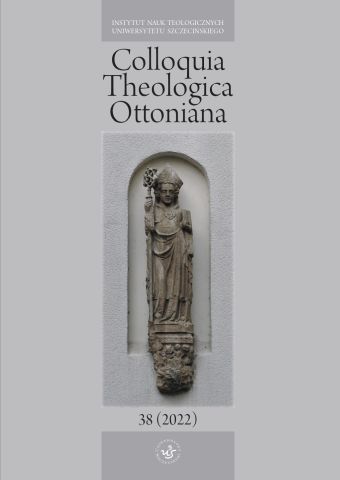
ISSN: 1731-0555
eISSN: 2353-2998
OAI
DOI: 10.18276/cto.2022.38-11




Issue archive /
38/2022
Ekofilozofia a filozofia prawa rozumianego jako forma symboliczna
(ECOPHILOSOPHY AND THE PHILOSOPHY OF LAW UNDERSTOOD AS A SYMBOLIC FORM)
| Authors: |
Ewa
Kosowska-Czapla

Uniwersytet Szczeciński |
| Keywords: | ecophilosophy Ernst Cassirer symbolic form philosophy of law |
| Data publikacji całości: | 2022 |
| Page range: | 21 (237-257) |
Abstract
This article aims to find the paradigm of ecophilosophy in the philosophy of symbolic forms in the context of law. At the time of the article, ecophilosophy needed an introduction, and it needed to be defined within the scope of the philosophy of law. First, the symbolic universe was presented as the starting point for the search for this paradigm. The world in which the animal symbolicum lives differs significantly from the world of other organisms because only man lives in the symbolic universe. The symbolic universe was defined as a world consisting not only of material reality but also of numerous networks formed by symbols such as language, myth, and religion. Humankind recognized reality differently but also co-creates it.Next, Ernst Cassirer’s philosophy of symbolic forms was presented in more detail with particular emphasis on law. The philosopher identified nature as the sphere of lawfulness, and he acknowledged the wisdom of nature manifesting itself in harmony and biodiversity. He looked for sources of natural human rights. Man as an animal symbolicum should participate as the co-creator of the great masterpiece of creation. This act of co-creation included morally righteous actions, as well as establishing the appropriate content of law. Consequently, according to the philosophy of symbolic forms related to ecology, the guiding principle – a paradigm in the relationship between man and nature – should be the principle of personal, social, and state responsibility for nature. I called this principle the pneumocentrism paradigm of ecophilosophy. Additionally, I looked for acceptance or rejection of this principle, including in court rulings in Poland. I noted that in some ways the existence of this principle is considered desirable; however, its implementation may become a difficult task for mankind. Among other things, humankind desires to satisfy their own needs and faith quickly in future technological possibilities as a way to reduce its destructive actions towards nature in the present.
Download file
Article file
Bibliography
| 1. | Cassirer E., Esej o człowieku. Wstęp do filozofii kultury, Warszawa 1977. |
| 2. | Cassirer E., Tragedia kultury, „Prace kulturoznawcze” 10 (2007), s. 38–58. |
| 3. | Cassirer E., Naturalistyczne i humanistyczne uzasadnienie filozofii kultury, „Archiwum Historii Filozofii i Myśli Społecznej” 56 (2011), s. 317–342. |
| 4. | Coskun D., Law as Symbolic Form: Ernst Cassirer and the Anthropocentric View of Law, Dordrecht 2007. |
| 5. | Franciszek, Encyklika Laudato si’ Ojca Świętego Franciszka poświęcona trosce o wspólny dom, 24 maja 2015. |
| 6. | Hull Z., Ekofilozofia – przedmiot i pole problemowe, „Przegląd Filozoficzny. Nowa Seria” 3 (2012), s. 235–248. |
| 7. | Kmiecik A., Logika ogólna i transcendentalna Immanuela Kanta, „Filo-Sofija” 4 (2004), s. 27–46. |
| 8. | Krupa G., Paradygmat dialogiczny we współczesnej filozofii, w: Poglądy i myśli filozoficzne, red. K. Maciąg, E. Chodźko, Lublin 2020, s. 58–81. |
| 9. | Lorenz K., Odwrotna strona zwierciadła. Próba historii naturalnej ludzkiego poznania Warszawa 1977. |
| 10. | Łaciak P., Struktura i rodzaje poznania a priori w rozumieniu Kanta i Husserla, Katowice 2003. |
| 11. | Łepko Z., Etologiczne inspiracje ekofilozofii, w: Ochrona środowiska społeczno- -przyrodniczego w filozofii i teologii, red. J.M. Dołęga, J.W. Czartoszewski, A. Skowroński, Warszawa 2001, s. 135–164. |
| 12. | Rakoczy B., Prawo ochrony przyrody, Warszawa 2009. |
| 13. | Skowroński A., Ekofilozofia – jako praktyczna filozofia przyrody, „Roczniki Filozoficzne” 54 (2006) 1, s. 355–359. |
| 14. | Strzelecki R., Odpowiedzieć Byciu. Odpowiedzieć Innemu. Perspektywy etyki fenomenologicznej i etyki dialogicznej, rozprawa doktorska, Uniwersytet Jagielloński, Repozytorium Uniwersytetu Jagiellońskiego 2010, https://ruj.uj.edu.pl/xmlui/bitstream/handle/item/38779/strzelecki_odpowiedziec_byciu_odpowiedziec_innemu.pdf?sequence=1&isAllowed=y (dostęp: 16.02.2022). |
| 15. | Suchodolski B., Kształt życia, Warszawa 1982. |
| 16. | Szmulik B., Prawa człowieka – pojęcie, geneza oraz klasyfikacja, w: Dylematy praw człowieka, red. T. Gardocka, J. Sobczak, Toruń 2008, s. 443–453. |
| 17. | Tatarkiewicz W., Historia filozofii, t. 3, Warszawa 1968. |
| 18. | Uchwała Sądu Najwyższego z dnia 28 maja 2021 r. w sprawie o sygn. akt III CZP 27/20. |
| 19. | Wyrok Sądu Okręgowego w Krakowie z dnia 7 września 2017 r., sygn. akt II Ca 1111/17. |
| 20. | Wyrok Sądu Rejonowego w Olkuszu z dnia 28 maja 2021 roku, sygn. akt I C 105/20. |
| 21. | Z teorii i filozofii prawa Zygmunta Ziembińskiego, red. S. Wronkowska, Łódź 2007. |
| 22. | Żywczok A., Więź człowieka ze środowiskiem naturalnym. Rekonstrukcja i interpretacja dorobku naukowego Bogdana Suchodolskiego, „Przegląd Pedagogiczny” 1 (2020), s. 65–84. |